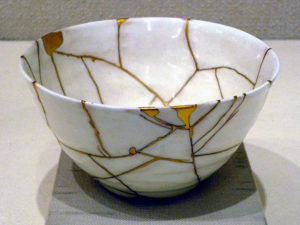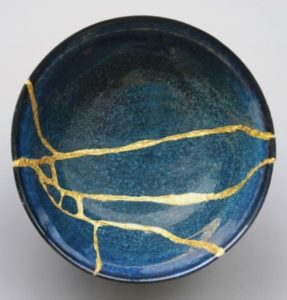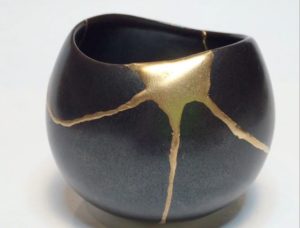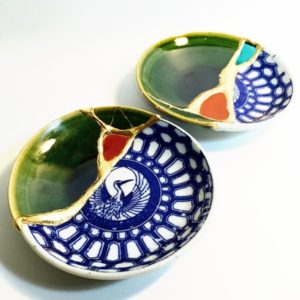Kintsugi: The Golden Joinery of Love
On Sue Cochrane's website is a button that says "Click Here for Unconditional Love"- it leads to a selection of writings that offer exactly that. It isn't just the words of Sue's stories that touch the reader, but the wordless energy behind them. Sue Cochrane survived a traumatic childhood to become a pioneering family court judge. Throughout her career she strived to put the heart back into the body of the law. Her first stark cancer diagnosis came when her three adopted sons were little more than babies. In the eighteen years that followed, Sue lived and loved through a series of profoundly serious diagnoses, including Stage IV breast cancer, and a brain tumor that was deemed inoperable. In the midst of intense and difficult treatment regimens, she never stopped learning, or leaning towards the light. On February 13th, 2021, Sue passed peacefully at home. In honor of her life and legacy, we share one of her beautiful "Unconditional Love" posts here...
September 7th, 2018
I was surprised and honored to be invited as a keynote speaker last  month in Atlanta for an innovative national health care organization. A few years ago, my brother introduced me to his friend, the CEO of this company, via e-mail. He is a remarkable leader and writer who follows my cancer journey with kindness and support. We agreed I would focus part of the talk on the terminal cancer diagnosis and how I stay positive, even joyful, despite this challenge. I knew the team was young, and I wanted at the very least to be interesting, and if possible, inspirational.
month in Atlanta for an innovative national health care organization. A few years ago, my brother introduced me to his friend, the CEO of this company, via e-mail. He is a remarkable leader and writer who follows my cancer journey with kindness and support. We agreed I would focus part of the talk on the terminal cancer diagnosis and how I stay positive, even joyful, despite this challenge. I knew the team was young, and I wanted at the very least to be interesting, and if possible, inspirational.
I knew it was not going to be easy to simmer my life’s journey and message into one hour. I had also just learned the cancer had advanced beyond my brain and bones, into the liver and lungs. I sincerely was “walking the walk” and not just “talking the talk” as they say in A.A.
At one point, after several weeks, I found myself fretfully pawing through fifty pages of notes, books and several outlines spread over my desk, chair and floor, but I still had no theme.
I have learned when this happens while writing, I need to set it all aside and take a break for a day or even longer. Then I start fresh on a blank page with an open mind. I did that here. I began by creating a list of “Books that Help Me Live a Good and Happy Life,” something I have wanted to do ever since I got the terminal diagnosis to give my three sons. Next, I gathered together all my favorite quotes and poems, which I have been collecting for years. I did not write a single word of the talk that day, but I noticed two recurring themes in my favorite works: overcoming tragedies and unconditional love.
It was then, surrounded by my beloved books, quotes and poems, that I received the answer on how to put the pieces of the talk together. Something a friend told me in passing months earlier, came to mind.
She had mentioned an ancient Japanese method of repairing broken porcelain that uses gold to fill the cracks. I remembered loving that idea immediately— more than Leonard Cohen’s famous lyric, “there is a crack in everything and that is where the light comes in.” For some reason when I pictured being cracked up inside, I tended to feel a harsh wind coming in, not the light.
This method of restoring breakage with gold is called Kintsugi (also known as Kintsukuori) and translates as “golden joinery.” I did some quick research and discovered that Kintsugi is an outgrowth of the Japanese philosophy of Wabi-Sabi, which honors the beauty of imperfections.
The Kintsugi artisan uses gold or other precious metal mixed with epoxy to repair the broken piece. This method emphasizes, rather than hides, the breakage. The repaired piece is often considered even more beautiful than the original.
Kintsugi embraces the breakage as part of the object’s history, instead of something unacceptable to be hidden or thrown away. This is the opposite of what I was taught. I learned that I was supposed to be perfect, and that I must hide any imperfections. This belief is imbedded in our culture: if something is broken, toss it out; if something is flawed, hide it.
Kintsugi was the perfect metaphor for my talk on how I was able to find healing in a life that for a long time, was not only cracked, but broken apart—and, in a few places, shattered beyond recognition.
When I was suffering as a child in a home filled with violence, alcoholism and poverty, my maternal grandmother would take care of me and my younger brother almost every weekend. I remember rushing in to hug her ample body, always in a faded small-print dress, her cheeks red from baking, gardening, making soap and canning. My grandparents created a small farm in their inner city backyard. Whatever else they needed, our grandfather built by hand. They raised four children during the Great Depression through their hard work and faith in Jesus. Every night we said the rosary, and every morning went to Mass. Afterwards, I could swing under the grape arbor for hours, sit at the oak table in her kitchen, eating fresh apple pie and watching her cook. We did not say much, but I basked in the warmth of her loving presence. During those frightening times of my life, my grandmother healed me with her unconditional love.
In my early twenties, with my grandparents and parents dead, I turned to alcohol to block out the pain. I constantly wished that my childhood had been a different one, that I had been born into a different family with different circumstances. I resented spending most of my time trying to recover from the damage. It was hard work trying to fix myself, and to be honest, that never really worked anyway.
Learning about Kintsugi helped me look back and realize that my greatest wish was to be unbroken pottery, instead of who I was. That caused me so much suffering because it was impossible. When I finally had the courage to show those broken edges to others— to my brother, to dear friends, in A.A., in counseling and in safe communities— I received acceptance, and was loved and respected just the way I was, in the same way my grandmother did. My broken parts were transformed into what students of Kintsugi call “precious scars” which honored my whole life, leaving nothing out.
There are many ways to find healing beyond what I share here. It can be a painstaking practice—mine was not quick or easy, and it is still ongoing— like the skill and care required to do Kintsugi restoration. Through it all, I keep coming back to love as the answer, the golden repair that has lasted.
I found that I needed to find unconditional love for myself too, and not just seek that from others. Then I found that I could begin to love others’ whole beings without judgment. I believe this helped me be a far better parent, friend and family member, and it changed the course of my professional life. Best of all, others who are on difficult healing journeys seem to find inspiration when they see my extensive golden scars, and for that I am grateful.
I no longer think of my broken parts as wounds. They are part of my history, and who I have become. As an ancient Kintsugi quote says, “The true life of the bowl began the moment it was dropped.”
My talk was not perfect. They gave me a standing ovation anyway. I had the honor of hearing individually from a number of the participants, who courageously shared their personal stories with me. Together we created an opening of mutual care that is rarely seen in a business setting.
One of my mentors, Dr. Rachel Remen, pioneer of holistic medicine, co-founder of Commonweal Cancer Help Center and best-selling author of Kitchen Table Wisdom tells a story in her book about meeting Dr. Carl Rogers, the humanistic psychologist. When she was a young doctor she saw him demonstrate his method which he called “Unconditional Positive Regard.” A colleague of hers volunteered to be the “patient” and he got up on stage with Rogers. Before he began the demonstration, Dr. Rogers paused a moment, looked at the audience and then said this:
“Before every session I take a moment to remember my humanity. There is no experience that this man has that I cannot share with him, because I too am human. No matter how deep his wound, he does not need to be ashamed in front of me. I too am vulnerable. And because of this, I am enough. Whatever his story, he no longer needs to be alone with it. This is what will allow his healing to begin.”
I can add nothing to these words. They are pure gold.
There are three types of Kintsugi repair. The first level is when all pieces are available and the cracks are filled with gold to restore the piece.

The next level is when small pieces are missing. Those areas are completely filled with gold:

Last, when large areas of the piece are missing or shattered beyond repair, the artisan will take fragments from unrelated pieces to create a patchwork design. This is the one I identify with the most:

Below are the poems, and quotes I wove into the talk, along with Kintsugi, and my personal—still growing—book list I shared with the group afterwards.
The Guest House by Rumi
This being human is a guest house.
Every morning a new arrival.
A joy, a depression, a meanness,
some momentary awareness comes
as an unexpected visitor.
Welcome and entertain them all!
Even if they are a crowd of sorrows,
who violently sweep your house
empty of its furniture,
still, treat each guest honorably.
He may be clearing you out
for some new delight.
The dark thought, the shame, the malice.
Meet them at the door laughing and invite them in.
Be grateful for whatever comes.
because each has been sent
as a guide from beyond.
—Copyright 1997 by Coleman Barks. All rights reserved.
From The Illuminated Rumi.
Love your crooked neighbor
With all your crooked heart.
—W.H. Auden
The sun never says to the earth,
“You owe me!”
Look what happens
with a love like that—
It lights the whole sky.
—Hafiz
Summer Day
Who made the world?
Who made the swan, and the black bear?
Who made the grasshopper?
This grasshopper, I mean-
the one who has flung herself out of the grass,
the one who is eating sugar out of my hand,
who is moving her jaws back and forth instead of up and down-
who is gazing around with her enormous and complicated eyes.
Now she lifts her pale forearms and thoroughly washes her face.
Now she snaps her wings open, and floats away.
I don’t know exactly what a prayer is.
I do know how to pay attention, how to fall down
into the grass, how to kneel down in the grass,
how to be idle and blessed, how to stroll through the fields,
which is what I have been doing all day.
Tell me, what else should I have done?
Doesn’t everything die at last, and too soon?
Tell me, what is it you plan to do
with your one wild and precious life?
—Mary Oliver
Otherwise
I got out of bed
on two strong legs.
It might have been
otherwise. I ate
cereal, sweet
milk, ripe, flawless
peach. It might
have been otherwise.
I took the dog uphill
to the birch wood.
All morning I did
the work I love.
At noon I lay down
with my mate. It might
have been otherwise.
We ate dinner together
at a table with silver
candlesticks. It might
have been otherwise.
I slept in a bed
in a room with paintings
on the walls, and
planned another day
just like this day.
But one day, I know,
it will be otherwise.
—Jane Kenyon
Quotes:
You may not find a cure, but you can still receive healing.
—Michael Lerner, Co-founder of Commonweal Cancer Help Center, Bolinas, California
It does not really matter what we expect from life, but rather what life expects from us. We are being questioned by life, hourly, daily, moment by moment. Our answer—to respond with right action and right conduct.Life ultimately means, taking the responsibility to find the right answer to its problems, and to fulfill the tasks which are constantly set for each individual.
—Viktor Frankl
Viktor Frankl taught that everything can be taken from us but one thing—to choose one’s attitude in any given set of circumstances. We cannot change these circumstances of being human, (pain, illness, loss and death) but we can change our minds and thoughts.
There is no enemy. We have stopped fighting anything and anybody.
The Big Book of Alcoholics Anonymous
“Can this be Okay?”
—Mark Nunberg, Guiding Teacher
Common Ground Meditation Center
Minneapolis, Minnesota
Be kind whenever possible.
It’s always possible.
—Dalai Lama
Books that Help Me Live a Good and Happy Life:
Holy Bible, New Testament
Kitchen Table Wisdom, Stories that Heal, Rachel Naomi Remen, M.D.
Man’s Search for Meaning, Viktor E. Frankl
The Places that Scare You, A Guide to Fearlessness in Difficult Times, and When Things Fall Apart, Heart Advice for Difficult Times,Pema Chodron
The Girl Who Threw Butterflies, Mick Cochrane
My Experiments with Truth, An Autobiography by Mahatma Ghandi
Letters to a Young Poet, Rainer Maria Rilke
Meditations, Marcus Aurelius
Alcoholics Anonymous, Bill W.
The Prophet, Kahlil Gibran
The HeartMath Solution: The Revolutionary Program for Engaging thePower of the Heart’s Intelligence, Howard Martin and Lew Childres
The Velveteen Rabbit, Marjery Williams
Infinite Vision, How Aravind Clinic Became the World’s Greatest Business Case for Compassion, Pavithra K. Mehta, Suchitra Shenoy
The Gift, Poems by Hafiz
No Mud No Lotus, The Art of Transforming Suffering, by Thich Nhat Hanh
Tattoos on the Heart; The Power of Boundless Compassion by Father Greg Boyle
***.jpeg)
Join a special conversation this Saturday with author and writing teacher Mick Cochrane, Sue's beloved younger brother who helped publish her remarkable posthumous memoir, "The Crystal Gavel," this fall. More details and RSVP info here.
Syndicated from Sue Cochrane's blog, The Movement of Healing. Sue Cochrane served for 18 years as a Family Court Judge in Minnesota, until she was diagnosed with terminal cancer. Her blog The Movement of Healing focuses “on positive, uplifting and inspiring people, ideas and stories.”
SHARE YOUR REFLECTION
11 Past Reflections


On Nov 1, 2023 John McDargh wrote:

On Oct 31, 2023 Patrick wrote:
1 reply: Patrick | Post Your Reply

On Oct 31, 2023 Kristin Pedemonti wrote:
Indeed, there is a crack in everything, that's how the light gets in.
1 reply: Patrick | Post Your Reply


On Feb 18, 2021 Trishna wrote:
So saddened to hear of Sue's passing away after such a courageous and long battle with cancer. Her positivity was so uplifting and her presence so heartfelt. Sending warmest wishes to her family as you grieve such a deep loss in your hearts and praying for her peaceful onward journey.

On Feb 16, 2021 Liz P. Gopal wrote:
Most grateful for DailyGood's honoring Sue's Everlasting-Kind energy towards every being. She truly lived the quote by Mary Oliver "Tell me, what is it you plan to do
with your one wild and precious life?" -
When I read this post in 2018, I immediately became inspired to be Open-Hearted and Receive Life as it is while making my own KintSugi. Since 2018, I followed and listened to many of her talks- Always admiring how much of her strength came from the Love for life. I miss Sue (in the physical world), but now, she's becoming the LIGHT and joining the source for blessings to shine upon us. I love YOU Sue...Always, unconditionally.

On Feb 16, 2021 martina wrote:
Thank you for the beauty and grace in this reflection, and the lovely images it brings to mind. "We grow stronger in the broken places." Love to you, who hold Sue in memory and love, and who have shared her with the wider world. May blessings continue to unfold, as you share these beautiful reminders!


On Feb 15, 2021 Kristin Pedemonti wrote:
1 reply: Penny | Post Your Reply

On Feb 15, 2021 Kristin Pedemonti wrote:
Thank you for sharing Sue's Kintsugi piece, I remember reading it when first posted, it resonates today even more than before.
Kintsugi is an important part of my own recovery journey, and the work I do guiding others through this process both the physical art & applying thr philosophy of Kintsugi to our lives.
Indeed we are not broken, we are beautiful.
In May 2019 which on tour across the US & Canada sharing recovery from trauma sessions for survivors, I was body painted by Ren Allen in Johnson City, TN as Kintsugi come to life, a living canvas. It was one of the most profoundly healing experiences of my life. Forever grateful.
I've written a poem/story about this experience & am grateful to debut it on virtual stage March 21st as part of the Women's Storytelling Festival. ♡
Many blessings to Sue & her family. Msy Sue's memory & unconditional love live on in you. ♡

On Nov 12, 2023 Santana Star wrote:
Post Your Reply